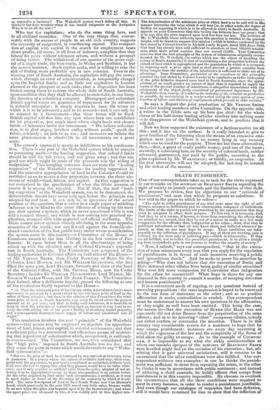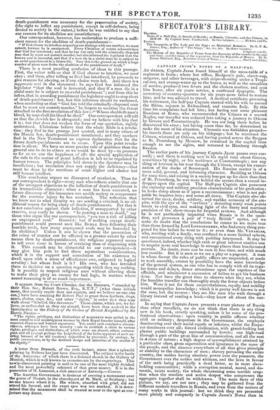DEATH PUNISHMENT.
ONE of our correspondents takes us to task for the views expressed in our remarks on the sentence on BEAUMONT SMITH regarding the
right of society to punish criminals and the limitation of that right. We propose to review, first his objections to our "rationale of punishment," and next that which he proposes to substitute. It was said in the paper to which he refers-
" The right to inflict punishment of any kind rests upon the right of self- defence, common to individuals and to communities composed of individuals. The limits of the right to punish are prescribed by the consideration that they must be adequate to effect their purpose. To this end, it is necessary, first, that they be of a nature, if known, to deter from committing the offence they are attached to ; second, that they be not of a nature to make men feel more compassion for the offender than indignation at his crime ; third, that they be published beforehand, so that all may know them, and inflicted whenever in- curred, so that no one may hope to escape. These conditions are indis- pensable to the infliction of punishment. if any of them are wanting, pain is inflicted for the mere sake of inflicting pain—which is inhumanity. If they are all fulfilled, not to inflict the prescribed punishment, is to allow a shrink- ing from sympathetic pain in our persons to weaken the security of society."
"Now, I submit," says our correspondent, " that. in the execu- tion of some miscreants every test that you apply for the regulation of punishments is in favour of such monsters receiving a public and ignominious death." And be seeks to prove his assertion by asking—"Who does not believe that the execution of Burke and Hare deterred other villains from being guilty of similar atrocities? Who ever felt more compassion for Courvoisier than indignation for the crime he committed? What hope is there for any one disposed in this country to commit a murder, of escaping detection and human punishment?" It is a convenient mode of arguing, to put questions instead of asserting propositions : the same impression is hoped to be conveyed by the one form of statement as the other ; and as no positive affirmation is made, contradiction is evaded. Our correspondent must be understood to answer his own questions in the affirmative, or they might as well have been omitted. This being the case, the answer is—that the execution of BURKE (for HARE was not executed) did not deter %nor from the perpetration of the same offence ; and as to its deterring " other" anonymous villains, nobody can either confirm or contradict the assertion. There is in this country very considerable reason for a murderer to hope that he may escape punishment : instances are every day occurring in which the vagueness of the law and the complexity of the forms of trial allow the guilty to escape. As to the example of COURVOI SIRE, it is impossible to say what the sickly sentimentalists at whom our remarks apropos of the sentence of BEAUMONT SMITH were levelled might feel on the occasion of his execution ; but, ad- mitting that it gave universal satisfaction, still it remains to be ascertained that the other conditions were also fulfilled. Our cor- respondent adduces two examples : in one be thinks the punish- ment was sufficient to deter from repeating the crime, in the other he thinks it was in accordance with public sentiment ; and instead of adducing a third example, he boldly affirms that escape from punishment is in this country impossible. He chooses to overlook the circumstance that all the three conditions were required to meet in every instance, in order to render a punishment justifiable. And even though our catalogue of requisites had been defective, still it would have remained for him to show that the infliction of
death-punishment was necessary for the preservation of society, (the right to inflict any punishment, except in self-defence, being denied to society in the outset,) before he was entitled to say that our reasons for its abolition are unsatisfactory.
Our correspondent, however, has undertaken to produce a suffi- cient reason for the abolition of death-punishment-
44 If God choose to interfere respecting our dealings with one another, we must submit, because be is omnipotent. Every Christian of course acknowledges that God has interfered; and that he has not only told the criminally-disposed man that he must not commit murder, but also informed the legislator that the human soul is immortal, and that if a man die in a sinful state he is subject to an awful punishment in a future life. Now this is the ground on which a large number of pious men desire the abolition of the punishment of death."
There is a most puzzling confusion of ideas in this passage. First, the writer tells us that if God choose to interfere, we must obey ; and then, after telling us God has interfered, he proceeds to give reasons for obeying, as if any choice were left. And there is a suppressio veri in the statement : he says God has informed the legislator "that the soul is immortal, and that if a man die in a sinful state he is subject to an awful punishment"; and from this he infers, that in awarding punishment the legislator ought to stop short of death-punishment : but, lest this inference should be weakened, when reminding us that " God has told the criminally-disposed man that he must not commit murder," he forgets to mention the threat attached to the first revelation of this law—" Whoso sheddeth man's blood, by man shall his blood be shed." Our correspondent will tell us that the Jewish law is abrogated ; and we believe with him that it is ; but that does not weaken the force of our quotation, rightly understood. Christians believe that the whole Bible is a revela- tion: they find in the passage just quoted, and in many others of the Mosaic law, death-punishment sanctioned; and they nowhere find in the New Testament an express declaration that for the future death-punishments are to cease. Upon this point revela- tion is silent. We have no more precise rule of guidance than the general one to do to others as we would be done by—to promote as far as we can the happiness of all : the special application of the rule in the matter of penal infliction is left to be regulated by human reason. The principles laid down in the Spectator may be insufficient ; but revelation does not supply the deficiency—that must be done by the exertions of some higher and clearer but still human intellect.
This conclusion argues no disrespect of revelation. Thus far our correspondent is right—every man who reflects admits that one of the strongest objections to the infliction of death-punishment is its irremediable character : when a man has been executed, no future discovery of his innocence can enable society to compensate for the extreme injury he has sustained. The reflection that 'ice know not to what futurity we are sending a criminal, is an ad- ditional reason for being chary of death-punishments. But that it is not conclusive against their infliction, if unsupported by other reasons, may easily be shown. "In putting a man to death," say those who argue like our correspondent, "you run a risk of killing an unprepared soul." Granted : but if nothing except death- punishment could prevent men like BURKE from following their horrible trade, how many unprepared souls may be hazarded by its abolition ? Unless it can be shown that the prevention of the crime of murder can be effected to a greater extent by other means than by death-punishment, the religious argument seems to tell even more in favour of retaining than of dispensing with it. This remark may be distasteful to our correspondent—it may give him pain to find these mysterious considerations, which it is the support and consolation of his existence to dwell upon with a sense of affectionate awe, subjected to logical scrutiny : but whose fault is it ? His own, who has intruded them as decisive on a question regarding which they say nothing. It is possible to respect religious men without allowing them to make their piety an excuse for bad logic, in matters where sound reasoning is of so much importance.























 Previous page
Previous page